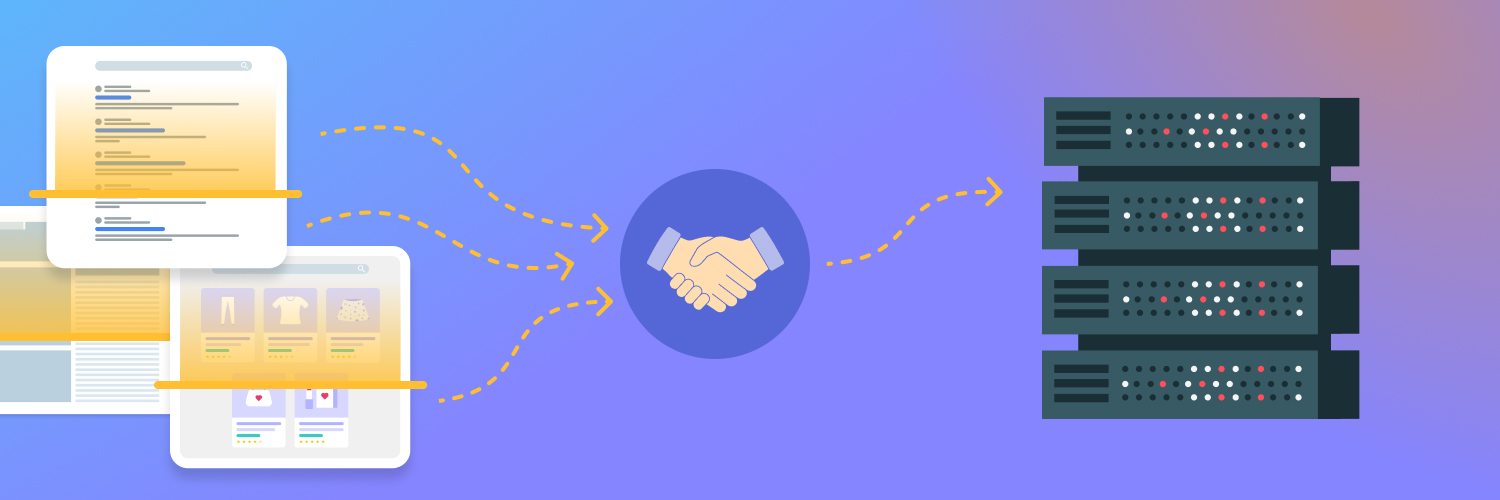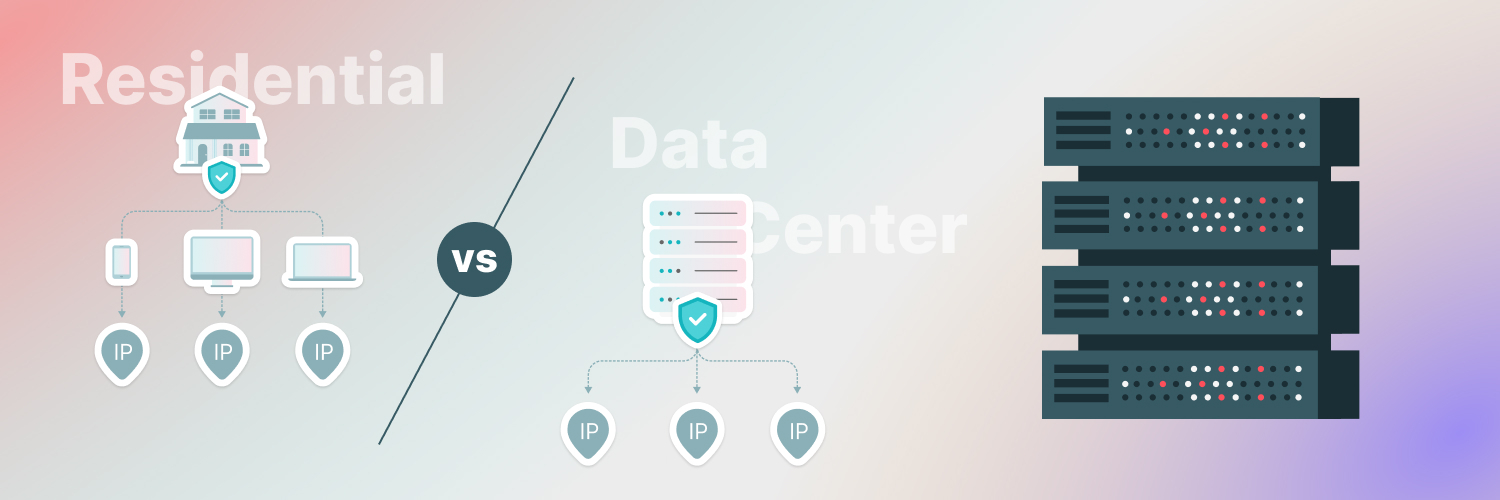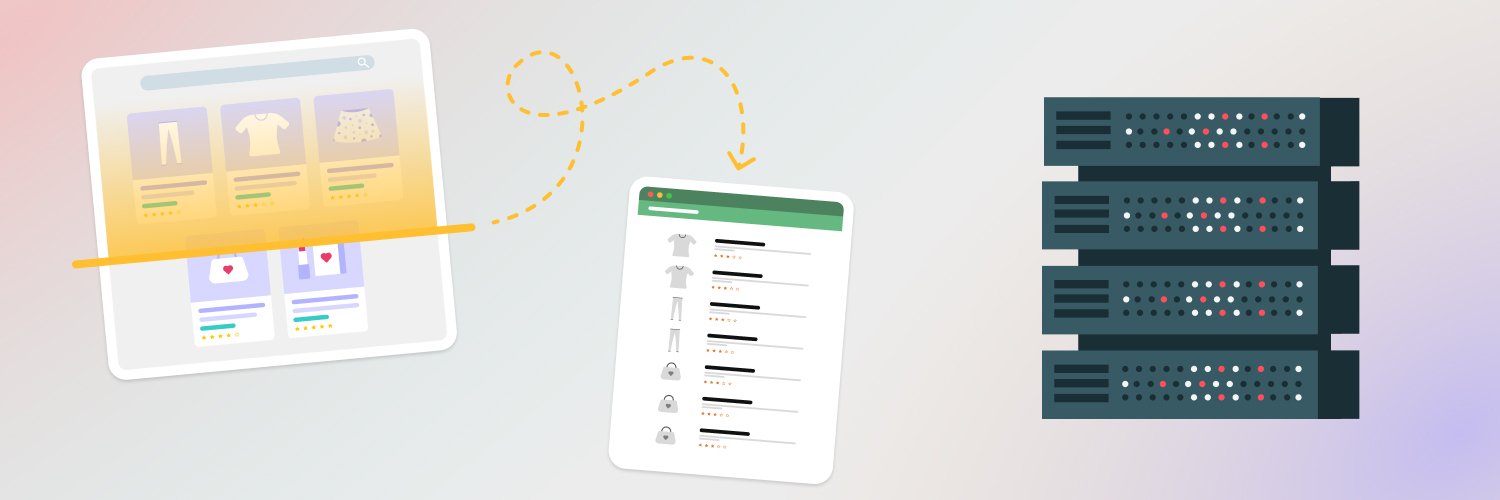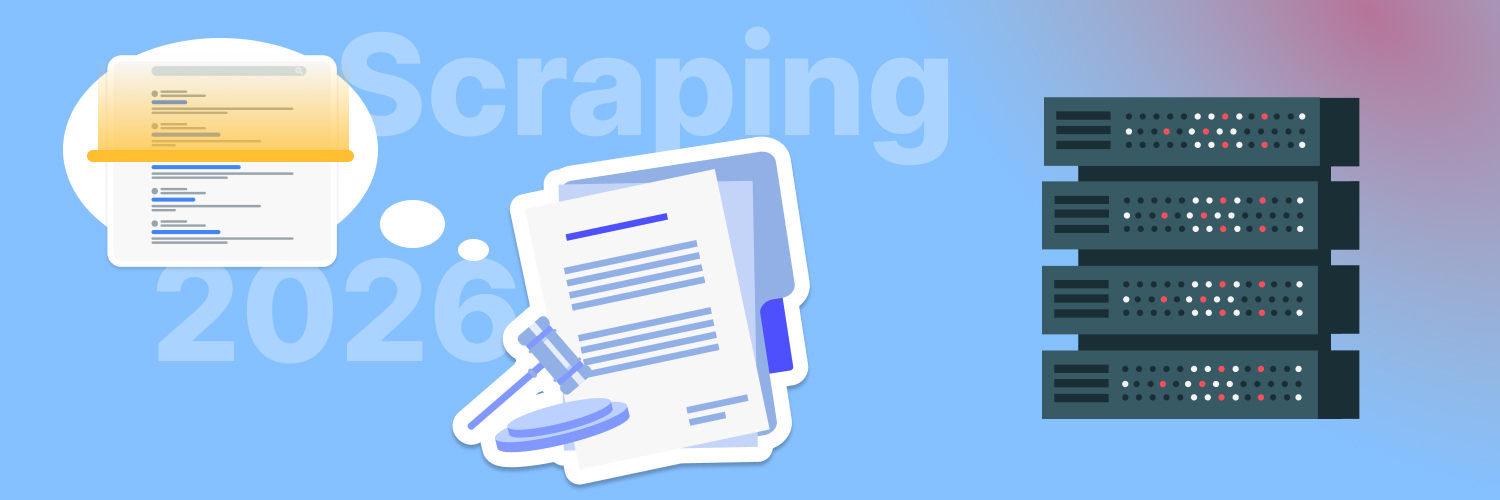Evaluating Python And PHP For Web Scraping Efficiency
Among the many programming languages available for web scraping, Python and PHP stand out as two of the most popular choices. Which language wins in the PHP vs. Python competition?
Python, with its rich ecosystem of libraries and frameworks, has gained a reputation for being user-friendly and highly efficient for data-related tasks. On the other hand, PHP, traditionally used for server-side web development, offers a unique set of advantages, particularly for those already familiar with its environment.
Try Our Web Scraping API
The easiest way to get your scraping project started!

This blog evaluates the efficiency of Python and PHP for web scraping, analyzing their respective strengths and weaknesses. By delving into the capabilities of both languages, we hope to provide you with the insights you need to choose the right tool for your web scraping projects.
Web Scraping Basics

Before getting into the PHP/Python debate, let’s explain web scraping.
Web scraping is the automated process of extracting data from websites. By mimicking human browsing behavior, web scrapers can navigate through web pages, retrieve relevant information, and store it in a structured format for analysis.
This technique is widely used across various industries, including e-commerce, finance, and research, for applications such as market analysis, price comparison, content aggregation, and lead generation. Organizations leverage web scraping to gain insights that inform strategic decisions, improve customer experiences, and enhance competitive positioning.
To facilitate the web scraping process, developers often utilize a variety of tools and libraries. In the Python ecosystem, libraries such as Beautiful Soup and Scrapy are popular choices. Beautiful Soup excels at parsing HTML and XML documents, making it easier to extract specific elements, while Scrapy is a more comprehensive framework designed for large-scale web scraping projects, offering features like built-in support for handling requests, data storage, and data pipelines.
For PHP developers, cURL and Goutte are commonly used. cURL provides a way to send HTTP requests and handle responses, while Goutte offers a convenient interface for navigating and extracting data from web pages.
Python for Web Scraping

When it comes to web scraping, Python has emerged as one of the leading programming languages. Its popularity can be attributed to several factors, including a rich ecosystem of libraries, a supportive community, and its ease of use for both beginners and experienced developers.
Popularity and Community Support
Python has seen exponential growth in popularity over the years, largely due to its versatility and ease of learning.
According to various programming language rankings, Python consistently ranks among the top choices for developers. This popularity translates into an extensive community of users who contribute to a wealth of resources, tutorials, and forums.
Whether you’re troubleshooting an issue or seeking best practices, you’re likely to find answers and guidance within the Python community.
Available Libraries
Python’s robust library ecosystem is a significant reason for its dominance in web scraping. Well-known libraries include:
- Beautiful Soup: A library designed for parsing HTML and XML documents. Beautiful Soup makes it easy to navigate the parse tree and extract the data you need.
- Scrapy: An open-source web crawling framework that provides a complete toolset for web scraping. Scrapy allows developers to manage requests, handle data pipelines, and store extracted data efficiently.
- Requests: A simple yet powerful HTTP library for Python. Requests makes it straightforward to send HTTP requests and handle responses, a crucial step in any web scraping task.
Advantages of Using Python
There are several reasons why developers use Python for web scraping tasks, including the following:
Easy to Learn and Use
One of Python’s standout features is its readability.
The syntax is straightforward and resembles plain English, making it accessible to newcomers. This ease of use reduces the learning curve, allowing developers to focus on solving problems rather than wrestling with complicated syntax.
For those just starting with programming or web scraping, Python is often the recommended choice.
Extensive Documentation and Community Support
Python’s documentation is comprehensive and well-organized, making it easy for developers to find what they need.
Additionally, the vibrant community contributes countless tutorials, blog posts, and videos that cover a wide range of topics, including web scraping. This abundance of learning resources helps newcomers get up to speed quickly while providing seasoned developers with advanced techniques and optimization strategies.
Strong Data Handling Capabilities
Python excels in data manipulation and analysis, largely thanks to libraries like Pandas and NumPy.
- Pandas: Provides robust data structures for managing and analyzing data, making it easy to manipulate and filter scraped data.
- NumPy: Offers support for large, multi-dimensional arrays and matrices, as well as a collection of mathematical functions to operate on these arrays.
When combined with web scraping, these libraries enable developers to not only extract data but also analyze and visualize it effectively.
Disadvantages of Using Python
Python has many advantages. However, it’s essential to be aware of its limitations as well.
Performance Issues with Very Large Datasets
One of the notable drawbacks of Python is its performance when handling extremely large datasets. Python is an interpreted language, which can lead to slower execution times compared to compiled languages like C or Java.
For projects involving massive data scraping and processing, this could result in longer processing times and increased memory usage, especially if the data needs to be held in memory during the scraping process.
Slower Execution Time Compared to Compiled Languages
As an interpreted language, Python generally has slower execution times than compiled languages. For many web scraping tasks, this difference may not be noticeable; however, when dealing with large-scale projects that require rapid data extraction and processing, this can become a bottleneck. Developers may need to consider optimizing their code or leveraging other languages for performance-critical components.
PHP for Web Scraping

PHP, a server-side scripting language, has been a staple in web development since its inception in the mid-1990s. It was designed specifically for web applications, and its long-standing use in this arena makes it a natural choice for web scraping tasks, especially for developers who are already familiar with the language.
PHP’s enduring presence in the web development landscape is a testament to its robustness and versatility. Millions of websites and applications use PHP, including well-known platforms like WordPress, Drupal, and Joomla. This widespread adoption means that PHP developers often have substantial experience, which can be leveraged when creating scraping solutions.
PHP’s seamless integration with various web technologies further enhances its appeal. It is a core component of the LAMP stack (Linux, Apache, MySQL, PHP), a widely used platform for building dynamic web applications.
This integration allows developers to utilize PHP for both front-end and back-end tasks, including web scraping. For example, a developer can scrape data and then immediately integrate that data into a PHP-based web application, streamlining the workflow.
Advantages of Using PHP
The following are some of the most noteworthy benefits of using PHP for web scraping:
Familiarity for Web Developers
One of the primary advantages of using PHP for web scraping is the familiarity many web developers already have with the language.
Because PHP is commonly used for server-side scripting, many developers have experience with its syntax and functions. This familiarity can speed up the development process, allowing developers to create scraping scripts quickly and efficiently.
For teams already working on web applications, incorporating scraping functionality in PHP can be a straightforward extension of their existing skill set. This reduces the need to learn a new programming language and allows for greater synergy within projects.
Fast Execution Speed for Simple Scripts
PHP is known for its execution speed, particularly when dealing with simple scripts.
For straightforward scraping tasks, such as fetching a single web page or extracting specific elements, PHP can perform quickly and efficiently. This speed can be particularly beneficial in scenarios where rapid data collection is essential, such as monitoring price changes on competitor websites in real time.
Moreover, since PHP operates on the server side, it can handle requests efficiently without burdening the client’s browser. This is especially useful in environments where server resources are optimized, allowing for multiple scraping tasks to be executed simultaneously without significant lag.
Good for Server-Side Scraping
Given its server-side nature, PHP is particularly well-suited for scraping tasks that need to be executed on a web server. This is advantageous for several reasons:
- Resource Management: Server-side scraping can take advantage of more powerful hardware than a local machine, enabling the processing of larger datasets more efficiently.
- Automation: PHP scripts can be scheduled to run at specific intervals using cron jobs or other task schedulers, making it easy to automate scraping tasks. This is particularly useful for businesses that need to collect data regularly without manual intervention.
- Integration with Databases: PHP’s strong capabilities for database interaction, especially with MySQL, make it easy to store and manipulate scraped data. Developers can scrape data and immediately save it to a database for further analysis or display on a web application.
Disadvantages of Using PHP
While PHP has its strengths, it also has some limitations that developers should consider when choosing it for web scraping.
Limited Libraries Compared to Python
One of the most significant drawbacks of using PHP for web scraping is the limited availability of libraries and frameworks explicitly tailored for this purpose. While PHP has some valuable libraries, such as cURL for making HTTP requests and Goutte for web scraping, the ecosystem is not as rich as Python’s. Python boasts numerous specialized libraries like Beautiful Soup and Scrapy, which offer extensive functionality for parsing HTML, handling requests, and managing data pipelines.
This lack of robust libraries means that developers using PHP may need to spend more time writing custom code to achieve the same functionality that existing Python libraries offer out of the box. This can lead to increased development time and potential bugs, as developers may need to reinvent the wheel for everyday tasks.
Less Community Support Specifically for Scraping
While PHP has a strong community overall, there is comparatively less focus on web scraping within that community. Many discussions and resources are centered around PHP’s capabilities in web development rather than its use as a scraping tool. This can make it challenging for developers seeking help or best practices specifically related to web scraping in PHP.
In contrast, the Python community has a dedicated focus on data science and web scraping, with numerous forums, blogs, and tutorials available. Developers using PHP may find themselves with fewer resources and less community-driven support when tackling scraping challenges, which can be frustrating, especially for newcomers.
Python vs. PHP: Performance Comparison

When evaluating the efficiency of PHP and Python for web scraping, several key performance factors come into play. This section will compare the two languages in terms of speed and efficiency, resource management, and scalability, helping developers make informed decisions based on their specific needs.
Speed and Efficiency
Speed is a crucial factor in web scraping, especially when dealing with large datasets or high-frequency scraping tasks. Generally, the execution speed of both PHP and Python can vary depending on the complexity of the scraping tasks and the libraries used.
- PHP: Known for its fast execution speed, PHP excels in scenarios involving simple scripts that retrieve single web pages or perform straightforward data extraction. For basic tasks, such as fetching HTML content or making HTTP requests, PHP often demonstrates impressive performance due to its efficient handling of I/O operations and optimized server-side execution. PHP’s cURL library, for example, is highly effective for making multiple HTTP requests concurrently, which can significantly reduce the total time taken for scraping tasks.
- Python: While Python is typically slower than PHP for simple tasks, its efficiency increases with the use of specialized libraries like Scrapy and Requests. Scrapy, in particular, is designed for web crawling and scraping, offering built-in features for managing multiple requests and asynchronous processing. As a result, Python can match or even outperform PHP for more complex scraping tasks involving multiple pages or data transformation.
For basic web scraping tasks, PHP may have a slight edge in the Python vs. PHP speed contest. However, for complex tasks or large-scale scraping projects, Python’s specialized libraries can optimize performance significantly, making it a strong contender.
Resource Management
Resource management is another vital aspect of performance in web scraping, especially when working with large datasets.
- PHP: Generally, PHP is lightweight and efficient in terms of memory usage, particularly for small to medium-sized scripts. It manages resources well when running on a web server, allowing multiple concurrent requests without significant resource strain. However, PHP can become less efficient when handling very large datasets, as it may require more memory to store the data during processing. Developers may also encounter issues with session timeouts or memory limits, especially if they do not optimize their scripts adequately.
- Python: Python can consume more memory than PHP for similar tasks due to its dynamic typing and higher-level abstractions. However, Python provides various ways to manage memory usage effectively, including generators and data streaming techniques. Libraries like Pandas allow for efficient handling of large datasets, but they can consume significant memory if not used carefully. That said, Python’s capabilities for handling larger volumes of data generally surpass those of PHP, making it a better choice for projects that require extensive data manipulation and analysis.
PHP may handle smaller tasks efficiently with lower memory consumption. However, Python offers better resource management options for larger datasets, making it preferable for more complex web scraping applications.
Scalability
Scalability is a crucial consideration when developing web scraping solutions, especially for projects that may grow in size and complexity over time.
- PHP: PHP can scale effectively within a web server environment, particularly when integrated with other components of the LAMP stack. Its ability to handle concurrent requests allows for horizontal scaling, where multiple instances of PHP scripts can run simultaneously across different server nodes. However, as projects grow and require more sophisticated scraping capabilities, PHP may require more manual handling for scaling. Developers might need to implement additional features for data queuing, error handling, and data storage, which could increase complexity.
- Python: Python is inherently designed for scalability, particularly with frameworks like Scrapy that are built with large-scale projects in mind. Scrapy supports asynchronous requests out of the box, making it easy to scrape multiple pages simultaneously without blocking. Additionally, Python’s strong data manipulation libraries (e.g., Pandas, Dask) facilitate the handling of large datasets, allowing for efficient processing and analysis as the project scales. For larger projects requiring extensive data collection, Python’s capabilities in managing complexity and scaling are generally superior to those of PHP.
Both PHP and Python have their strengths and weaknesses. However, Python emerges as the more scalable option for larger web scraping projects. Its robust frameworks and libraries are designed to handle the demands of high-volume data extraction and processing, making it a preferred choice for developers looking to build scalable solutions.
Best Practices for Web Scraping

When undertaking web scraping projects with either PHP or Python, following best practices is crucial to ensure efficiency, legality, and ethical responsibility. Here are some essential guidelines to keep in mind:
- Use Appropriate Libraries: Take advantage of libraries designed for scraping. In Python, libraries like Beautiful Soup and Scrapy streamline data extraction, while PHP’s cURL and Goutte can facilitate HTTP requests and HTML parsing.
- Code Structure: Organize your code to improve readability and maintainability. Use functions or classes to encapsulate scraping logic, making it easier to update or troubleshoot your code.
- Respect robots.txt: Always check a website’s robots.txt file before scraping. This file indicates which parts of the site bots can access. Scraping areas disallowed in robots.txt may lead to legal consequences.
- Rate Limiting: When you implement rate limiting in your scraping scripts, you can avoid overwhelming the target server. This means introducing delays between requests, mimicking human browsing behavior, and ensuring your activities don’t disrupt the website’s performance.
- Robust Error Handling: Anticipate potential errors, such as connection timeouts or missing data. Use try-catch blocks in your code to handle exceptions gracefully, ensuring that your script can recover from unexpected issues without crashing.
- Data Storage: Decide on a suitable method for storing scraped data, whether it be a database, CSV file, or other formats. Ensure your storage method allows for easy retrieval and manipulation, especially if you plan to analyze the data later. Properly structuring your data will facilitate future processing and improve overall workflow efficiency.
By adhering to these best practices, developers can conduct web scraping in a responsible and effective manner, maximizing the value of the data they collect while minimizing risks.
Choosing the Right Tool for Your Project

When selecting the appropriate tool for web scraping, the choice between Python and PHP largely depends on the specific requirements of your project, the expertise of your team, and considerations for long-term maintenance.
Python vs. PHP
Python is often the preferred choice for web scraping due to its robust ecosystem of libraries like Beautiful Soup and Scrapy, which simplify the process of data extraction and manipulation. It excels in handling complex scraping tasks, managing large datasets, and integrating with data analysis tools. If your project involves significant data processing or requires scalability, Python’s capabilities make it an ideal candidate.
Conversely, PHP may be more suitable if your scraping tasks are straightforward and your team is already experienced in PHP development. For projects closely tied to web applications built on the LAMP stack, PHP offers seamless integration and fast execution for more straightforward scraping tasks. If your needs are more about server-side scraping in a familiar environment, PHP can be a practical choice.
Considerations for Project Scope and Team Expertise
When determining the right tool, consider the scope of your project. For large-scale scraping operations requiring extensive data manipulation, Python’s frameworks are likely more beneficial. For smaller projects or quick tasks, PHP’s efficiency and ease of use may be sufficient.
Try Our Web Scraping API
The easiest way to get your scraping project started!

Additionally, assess your team’s expertise. A team well-versed in Python may leverage advanced libraries and techniques, while a PHP-focused team will find it easier to implement solutions in their existing framework.
Long-Term Maintenance
Finally, consider long-term maintenance. Python’s readability and community support can facilitate easier updates and debugging over time. In contrast, if your application evolves to require more complex features, transitioning from PHP to a more specialized language may introduce challenges.
Choosing the right tool hinges on aligning your project’s requirements with your team’s strengths and future maintenance needs.
Level Up Your Web Scraping With Rayobyte

As you assess your own web scraping needs, consider factors such as project scope, team expertise, and long-term maintenance requirements. Whether you lean towards Python or PHP, the right choice will ultimately depend on your specific goals and the resources at your disposal.
At Rayobyte, we understand the intricacies of web scraping beyond the PHP versus Python debate. We are committed to providing you with insights and services tailored to your unique challenges. Sign up for a free trial today.
The information contained within this article, including information posted by official staff, guest-submitted material, message board postings, or other third-party material is presented solely for the purposes of education and furtherance of the knowledge of the reader. All trademarks used in this publication are hereby acknowledged as the property of their respective owners.



